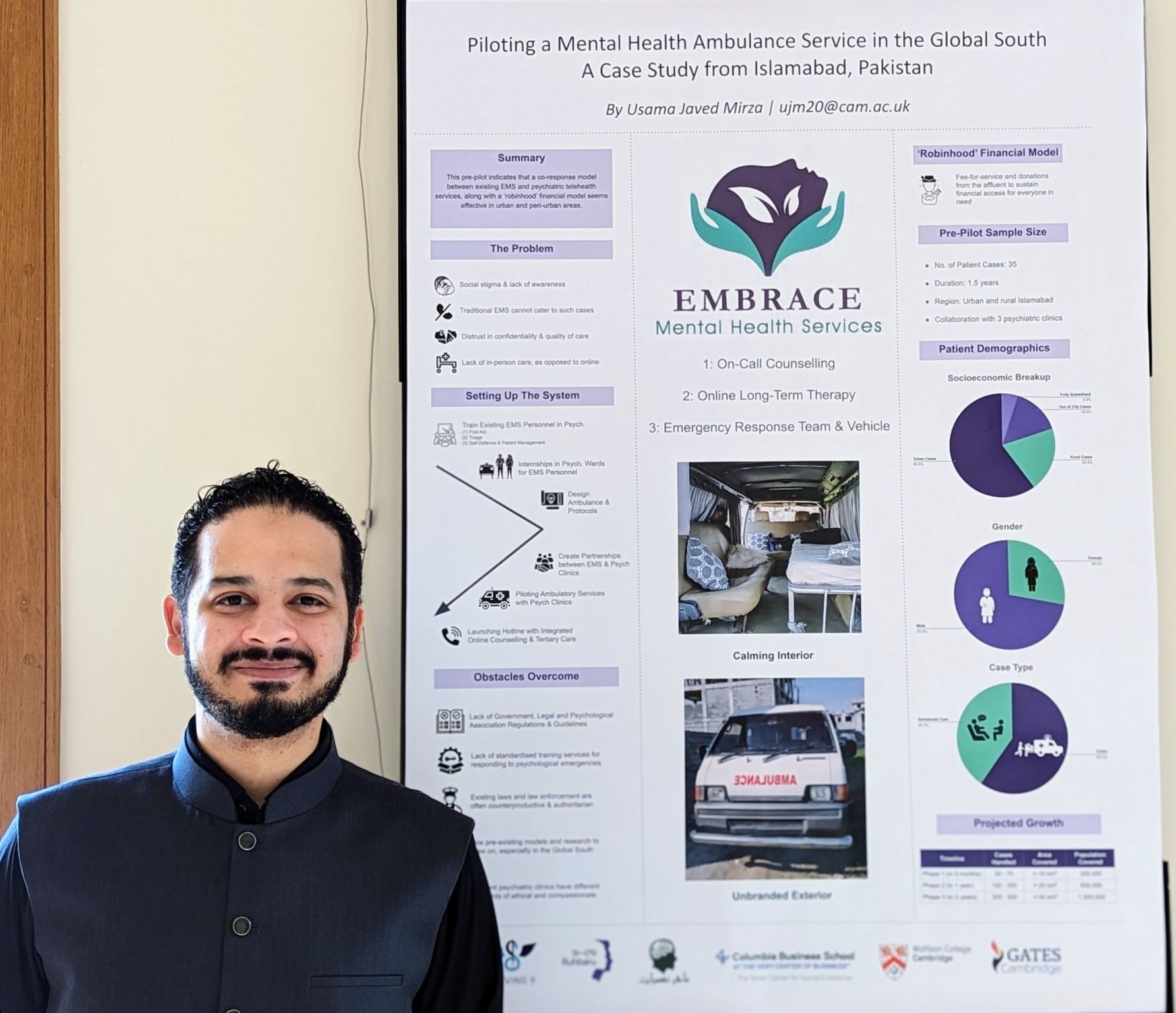
Usama Mirza talks about Saving 9, an emergency health responder service which has launched Asia's first mental health ambulance
Mental health has been rising up the global health priority list over the last few years, but Covid accelerated it. Yet the resources available to those in crisis situations are few. Gates Cambridge Scholar Usama Mirza is addressing one particular gap in his home country of Pakistan, having recently launched Asia’s first mental health ambulance in Pakistan earlier this year.
Usama did a presentation on the service at Wolfson College’s Global Health Research conference in late January. The initiative, run by Saving 9, the social enterprise Usama launched, has now been shortlisted for support from the Cambridge Social Venture Incubator. If it wins the aim is to expand the service outside Pakistan, tailored to different cultural contexts.
Usama [2022] has been interested in health for some time and trained as a paramedic first responder while he was an undergraduate in Physics at Lahore University of Management Sciences [LUMS]. “The experience changed my life,” he says. He also did some teaching as an undergraduate, heading up training in the emergency medical service department. After teaching in a high school in Pakistan Usama moved to the US on a Fulbright scholarship to study education at Columbia and also trained to be an emergency medical technician in the US system. It was while there that the idea for Saving 9 came to him. The social enterprise offers medical training, consultancy and sustainable emergency medical response systems to empower communities with inadequate access to healthcare services.
Medical emergency responders
Usama initially worked with a friend from LUMS on Saving 9 and approached schools and local governments offering emergency medical training on his return from the US in 2017. The organisation began working in a rural community in Islamabad where there was widespread illiteracy. It was forced to innovate as a result and worked with local commercial drivers launching a community-run Maseeha Ambulance system.
Soon after the initial success of piloting the service, it was found that there was a strong need for female medical emergency responders as, due to local cultural values, female patients were reluctant to be treated and transported by men. This led to the launch of a women-led and run ambulance system for the community, with housewives and school teachers being trained by Saving 9 as medical first responders. The women were also the first in their community to gain driver’s licences.
Since its early days the services have supported over 1,200 patients, won funding from Harvard’s The Lakshmi Mittal and Family South Asia Institute and the Tamer Centre for Social Enterprise at Columbia Business School and have featured on the BBC’s Urdu service.
Mental health ambulance
During Covid it became clear that there was a real need for more support for mental health patients. Traditional ambulances and hospitals would often not take patients and families were forced to manage on their own. Usama decided to set up a mental health ambulance service, following a model pioneered by Sweden, to fill the gap in provision. Saving 9 also developed online counselling and a referral service alongside its emergency care provision. It brought in international psychology experts and worked carefully with them and with stakeholders to develop quality training, create an ethical service and to build relationships with mental health institutions. It launched a soft pilot in three different mental health facilities in Islamabad last year and dealt with around 40 emergencies before going public in January.
Staff are trained to deal with a range of medical emergencies, from dealing with people who are having a schizophrenic or bipolar episode to people suffering from drug-induced psychosis and dementia. Where possible, they work with carers to get a good picture of the patient’s needs and a psychiatrist is always on that preparatory call and an in person assessment is also conducted. The ambulance itself is unmarked so as not to attract stigma, but it has a siren and ambulance sign which can be used in emergency situations to cut through traffic. Inside the ambulance looks like a therapeutic setting rather than a traditional ambulance. The colours are neutral so as not to increase stress.
Saving 9 has also worked with schools to train teachers and administrators to identify mental health issues. The aim is to increase access to mental health treatment as currently it is often confined to those who can afford to pay for it. Saving 9 is also working on a mental health index which can score different areas on the support available for students’ socio-emotional wellbeing.
Usama is passionate about education and about the role education can play in preventing ill health. His PhD is in Education and he has just published a paper in UCL Press’s London Review of Education, titled ‘Islamic Scientific Critical Consciousness for Muslim Science Educators’. The article is open-access and is about developing an anti-colonial and anti-racist social justice education approach to teaching science within an Islamic framework.












